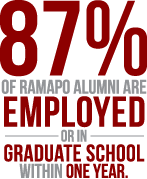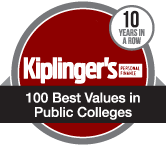College Catalog: 2011-2012
General Education
About the Program
Situating students in a critical context is paramount if they are to grasp the complex nature of social, political and psychological issues in the twenty-first century. Without adequate grounding in the liberal arts, students cannot develop the abstract thinking skills to grapple with issues like the problematic nature of economic growth and development, cultural studies and the arts, the contemporary nature of the nation-state, the relevance of the human genome project for the development of drug therapies, the impact of laboratory information systems in chemistry, and the changing hegemony of psychological theories.
Both the College and the larger social context have been altered during the past two decades. The nature of technology, the organization of the economy (locally, nationally and globally) and academic discourse (to name just a few examples) have been transformed during this period. These changes are reflected in the general education curriculum.
All students are obligated to fulfill a basic program in General Education. The courses in the program are distributed throughout the four years of study.
The list below shows the distribution of the required General Education Core courses and categories. Courses which fulfill the General Education categories are listed each semester on the web for students.
GENERAL EDUCATION PROGRAM REQUIREMENTS (10 COURSES)
FIRST YEAR
100 LEVEL One Course
INTD 101 First-Year Seminar (FYS) (Also AIID 101, CNTP 101 and HNRS 101)
Designed especially for first-year students, First-Year Seminar (FYS) provides a comprehensive introduction to college-level learning. FYS courses are developed around an academic theme or topic based on the expertise of each course instructor, providing students with the opportunity to select a seminar that best suits their interests. FYS encourages new students to participate in a community of learners, to strengthen their critical thinking skills, and to communicate effectively both orally and in writing. First Year Seminar Website
100 LEVEL One Course
CRWT 102 Critical Reading and Writing II (was ENGL 180 College English)
The objective of this course is to strengthen students’ critical reading and writing. The course will include writing a research paper and developing information literacy. Students will participate in revising, peer critiquing, and faculty-student conferences.
100 LEVEL One Course
SOSC 101 Social Issues
The objective of this course is to provide a forum for the historical, academic and personal exploration of race, class, ethnicity and gender and the ways these categories can benefit or oppress college students and American Society. It will cultivate in-depth conceptual approaches to these key areas.
OR
BADM 115 Perspectives in Business and Society
The objective of this course is to explore modern American business. The course will examine the evolution of our economic system from historical, political, sociological, economic, and cultural perspectives, and will discuss current issues that involve industry within a changing social framework.
100 LEVEL One Course
History Category
The courses in this category develop an appreciation of change over time, and the often complex forces that have shaped the past. Students gain an understanding not just of content, but of historical process and method as well.
Courses which meet this requirement are:
HIST 101 Introduction to US History I
HIST 102 Introduction to US History II
HIST 105 Western Studies I
HIST 106 Western Studies II
HIST 109 World Civilization I
HIST 110 World Civilization II
100 LEVEL One Course
Mathematical Reasoning Category
The courses in this category develop a student’s mathematical reasoning skills including formulating and solving problems, thinking critically, and reasoning abstractly.
100 LEVEL One Course
Science with Experiential Component Category
This category contains 100-level science that provide a significant experiential component, which could be a lab or fieldwork. Students in these courses will create and analyze data.
SECOND YEAR
200 LEVEL One Course
AIID 201 Readings in the Humanities
This course is an introduction to major texts by authors who have produced distinctive statements about the human experience. The common core of readings will include selections from the Bible, Greek literature and philosophy, Shakespearean literature, and modern literature. The course will enhance students’ appreciation of the ways historical and philosophical narratives, fiction, poetry, and drama have helped enrich our understanding of human experience through extensive reading and reflective and analytical writing.
SECOND-THIRD YEAR
200-300 LEVEL One Course
Intercultural North America Category
Students will gain an understanding of different cultures and the relationships among cultures and peoples within North America (i.e., the United States, Canada, Mexico, and the Caribbean.) Students will reflect upon and analyze texts and products which illustrate the symbolic nature of culture and the exchange of meaning. Courses will examine cultural and artistic productions, everyday life, material culture, and other manifestations of culture, as well as how these are linked to heritages and peoples beyond North American boundaries.
200-300 LEVEL One Course
International Issues Category
The objective of courses in this category is to provide a context through which students learn to interpret and critically analyze recent world events, focusing on the coordination of economic, cultural, social, and political activities. Courses will examine the increasing interconnectedness of nations and peoples throughout the 20th and 21st centuries.
200-300 LEVEL One Course
Topics Category courses:
- address subject matter in historical context.
- feature readings and/or other “texts,” including film and visual arts, where appropriate.
This requirement will be fulfilled by taking one Topics Category courseoutside of the student’s major:
For arts/humanities majors – Topics: Social Science
For business majors – Topics: Arts and Humanities OR Topics: Social Science
For science majors – Topics: Arts and Humanities OR Topics: Social Science
For social science majors – Topics: Arts and Humanities
Topics: Arts and Humanities Category
Courses in this category introduce students to the methods of inquiry in the arts and humanities through the critical examination of works (texts, artworks, artifacts, performances, films, media, etc.). This category includes courses which provide the social, cultural, and historical contexts of the field of inquiry.
Topics: Social Sciences Category
These courses provide students with a scientific understanding of the social forces which shape human experience and society over time. Students apply theories and methods to the study of human and social development, group behavior, and the resolution of collective conflicts.
Writing Intensive Requirement
Three writing intensive courses in the general education curriculum are required: First Year Seminar, Critical Reading and Writing (formerly College English), and Readings in Humanities.





